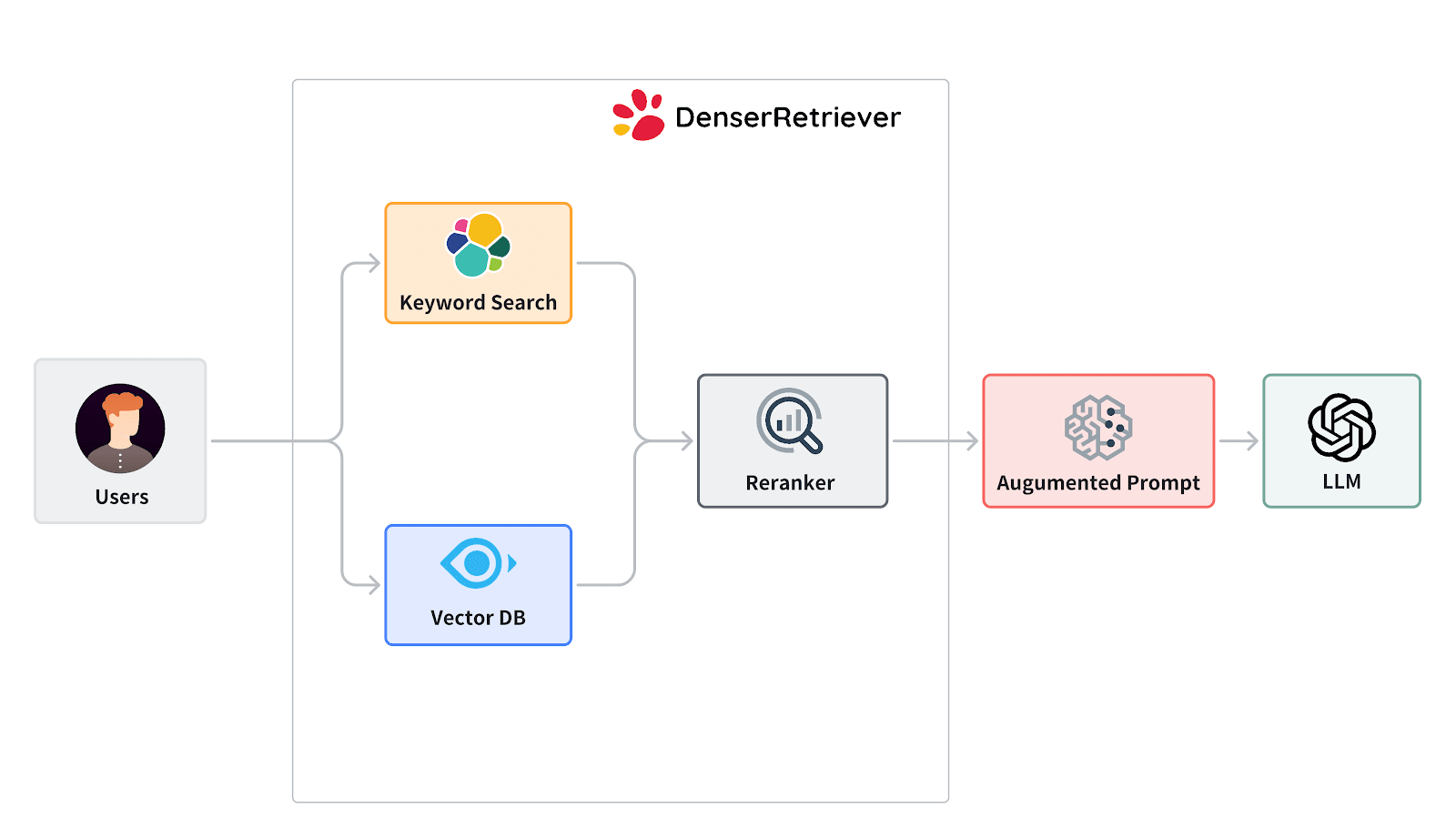
5 Best Algolia Alternatives (Full Comparison)

Algolia is a search and discovery platform known for its quick search responses and user-friendly features like typo tolerance and geolocation search.
It's widely used across e-commerce, SaaS, and content management systems for its ability to improve user engagement and navigation.
However, despite its strengths, Algolia isn’t always the best choice for every business. Its cost can be high, especially for smaller businesses. Some companies also need more customization or specific features that Algolia may not offer.
Therefore, many businesses look for alternatives that better fit their needs.
Denser stands out as an alternative that offers AI-powered search and natural language processing (NLP) that goes beyond traditional search tools. It understands user intent while providing smarter, more conversational results for better user engagement.
Sign up for a free trial or schedule a demo today!
In this article, we’ll explore five alternatives to Algolia, focusing on their key features, pros and cons, and pricing models. By the end, you’ll have a clearer idea of which search tool can best meet your business goals.
Algolia's Use Cases#
Algolia is used across many industries to help users search for products, content, or valuable insights. Below are the platform's common use cases:
- Improves the online shopping experience by providing instant and accurate search results when browsing large product catalogs
- Enables readers to easily find articles, videos, and other types of media based on their preferences or search terms
- Helps SaaS platforms in searching for specific documents, user-generated content, or database entries
- Helps travel websites deliver personalized and relevant search results filtered by price, star rating, or amenities
- Allows potential real estate buyers to filter and search for properties based on specific criteria such as location, price range, and type of property
- Improves educational platforms' access to learning materials and resources
- Supports enterprise-level search by helping employees find documents, policies, or other internal resources
These use cases highlight why Algolia is a popular choice for powering fast, user-friendly search. But depending on your specific needs, there may be more flexible or cost-effective alternatives worth considering.
Top 5 Alternatives to Algolia for 2025#
While Algolia is a powerful search platform, some businesses may seek alternatives due to cost, complexity, or specific feature needs.
Here are the five best alternatives that offer unique features and pricing models:
1. Denser#
Denser takes search to a whole new level by bringing AI-powered search. Instead of merely matching keywords, it focuses on understanding the search intent to deliver relevant and useful results.
What sets Denser apart is its ability to combine search and conversational AI. It's an engaging platform that interacts with users in a natural way.

If you're running a website or managing large databases, Denser makes search feel like a conversation. Its semantic retrieval engine powers intelligent results that go far beyond simple keyword matching.
Here's why businesses love Denser:
- It uses semantic search to get the bigger picture, understanding the relationships between words to provide smarter, more relevant results.
- Real-time learning makes sure the system improves with every interaction, continuously refining personalized search results to be more accurate and personalized over time.
- Beyond search, it offers custom AI-powered chat solutions that keep users engaged and turn a simple search into a dynamic conversation.
Denser is perfect for businesses that want to offer more than just a basic search bar.
It's ideal for improving customer engagement, increasing conversion rates, and creating a tailored user experience.
Whether you're in e-commerce, media, or managing large datasets, Denser gives you a flexible, powerful solution that grows smarter with use.
When it comes to user satisfaction, Denser scores high on 5/5—it's known for being easy to implement and incredibly effective at delivering top-tier search results.
If you want to improve your platform with a smarter, more interactive search experience, Denser is the perfect fit for your business!
Denser Pricing Plans#
Denser offers a range of pricing plans to fit businesses of all sizes, from startups to large companies. Whether you're just starting or need a comprehensive solution for a bigger operation, there's a plan for you.
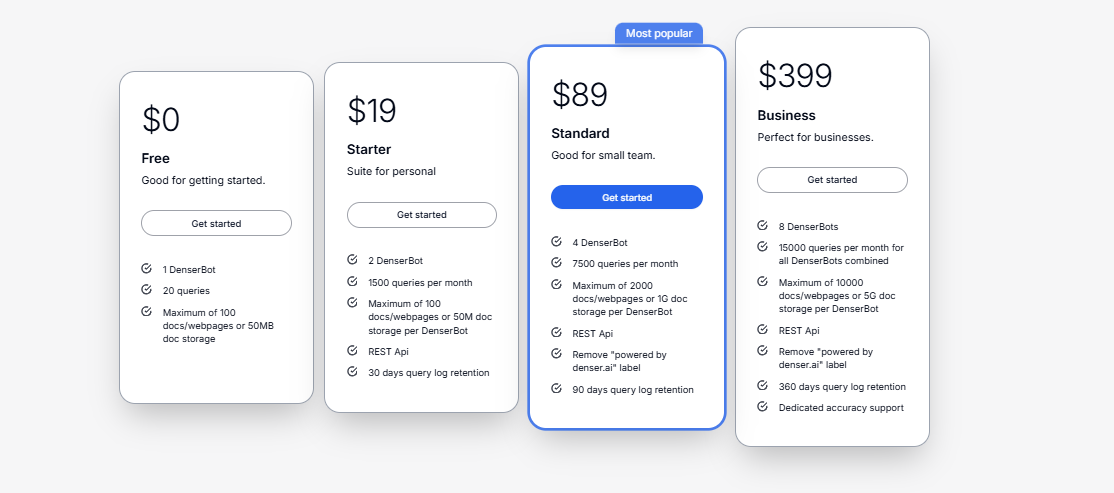
- Free plan: Great for startups who want to test out Denser with one DenserBot and up to 20 queries per month.
- Starter plan: For individuals or small startups, the Starter plan costs $29 per month and includes two DenserBots with 1,500 queries per month.
- Standard plan: Small teams can choose the Standard plan at $119 per month. It offers four DenserBots and 7,500 queries per month for more advanced needs.
- Business plan: Large businesses can go with the Business plan for $399 per month, which includes eight DenserBots and 15,000 queries per month to handle bigger operations.
Switch to Denser and see how intelligent, affordable, and user-friendly search can transform your business. Sign up for a free trial or schedule a demo today!
2. Elasticsearch#
Elasticsearch is a free, open-source alternative that supports full-text search, structured search, and detailed analytics. It supports various data types, including text, numeric, geospatial, and structured data, and offers powerful querying capabilities through its Query DSL.
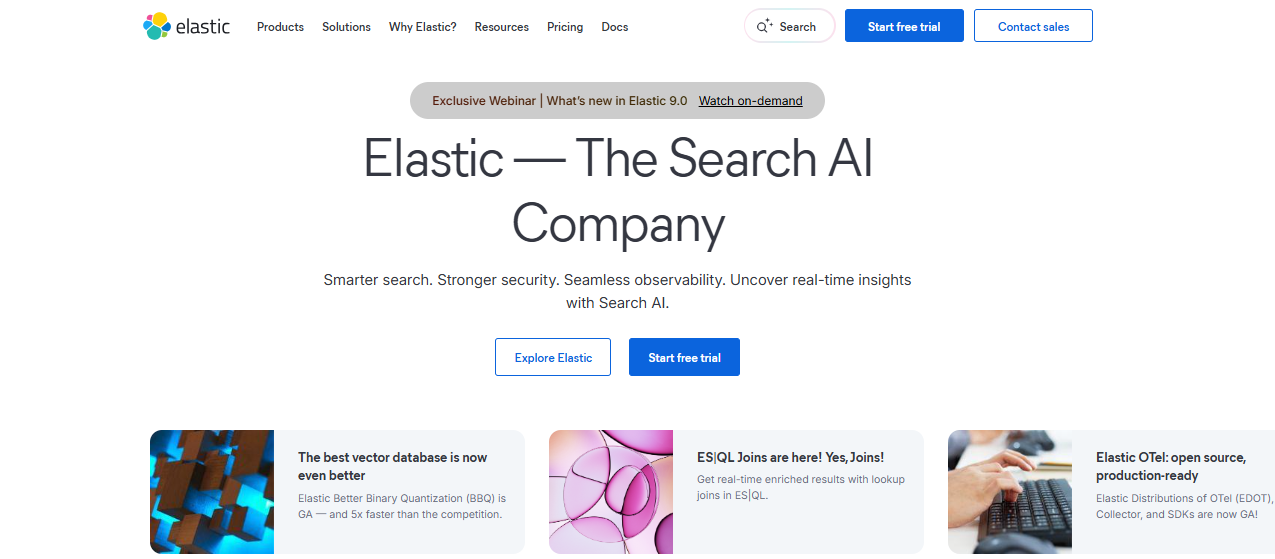
Image Source: elastic.co
The platform offers features like real-time indexing, distributed search, and support for various data types. Its security features include role-based access control, encrypted communications, and audit logging. Elasticsearch also provides machine learning capabilities for anomaly detection and forecasting.
Pros#
- Great at managing huge data sets and lots of traffic
- You can tweak it to fit complex search functionality and advanced analytics
- Free to use, which can save a lot on large projects
Cons#
- Requires more tech skills to set up
Pricing#
Elasticsearch offers multiple pricing models depending on how you choose to deploy it.
If you use the hosted Elastic Cloud service, pricing is based on the resources you allocate such as memory, storage, and the type of nodes you run.
If you prefer to manage your own setup, Elasticsearch provides a free basic tier with limited features. More advanced features like machine learning, security, and support are only available under paid subscriptions.
3. Apache Solr#
Apache Solr is a free search platform built for businesses and created with Java. It offers full-text search capabilities, faceted search, hit highlighting, and rich document handling.
Solr is designed for scalability and fault tolerance, with features like distributed indexing, replication, and load-balanced querying. It also provides a comprehensive administrative interface and supports various data formats for indexing.
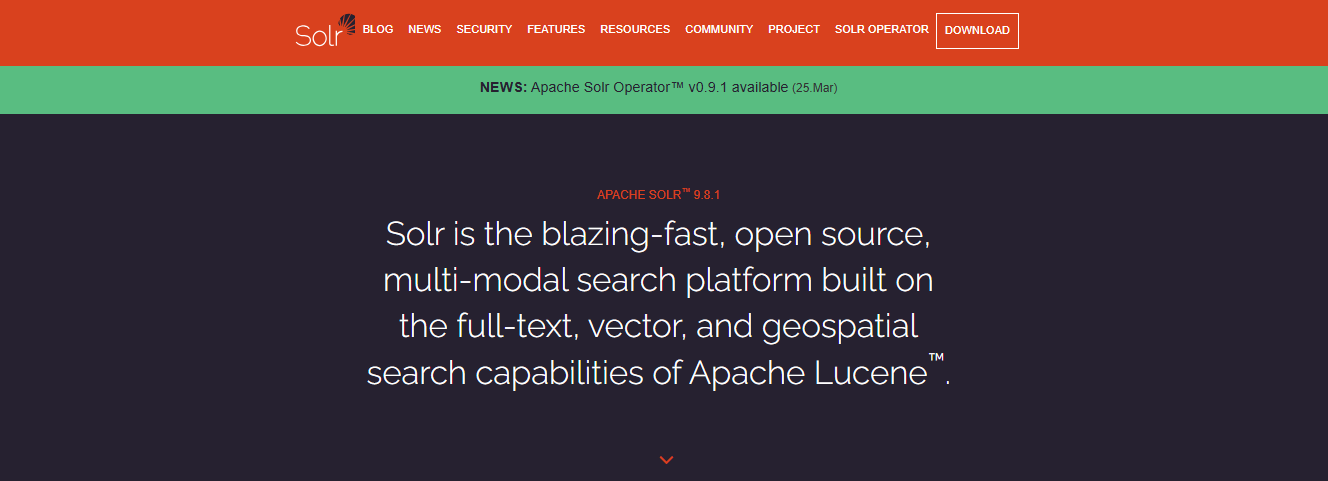
Image Source: solr.apache.org
Solr's extensible plugin architecture allows for customization and integration with other systems. It supports geospatial search and real-time indexing and provides a query language for complex search requirements.
Pros#
- Sort products for display, great for online stores and shops
- Filter results using faceted search to help users find what they're looking for faster
- Lets you set up custom search options like ranges and categories
- Simple query language for beginners
Cons#
- More tutorials and guides are needed to help beginners
- Needs more examples of how to use its features
- Guides and documentation need more detail and organization
Pricing#
Free, open-source search engine based on the Apache Lucene library.
4. Typesense#
Typesense is a free, up-to-date search engine built to be fast and easy to use. It offers typo-tolerant search, easy integration, and a user-friendly interface. It's designed for developers seeking a quick solution without the complexity of traditional search engines.
The platform's key features include real-time indexing, instant search results, and a simple API for integration. Typesense provides built-in support for synonyms, faceting, and filtering, suitable for e-commerce and other applications requiring fast and relevant search results.
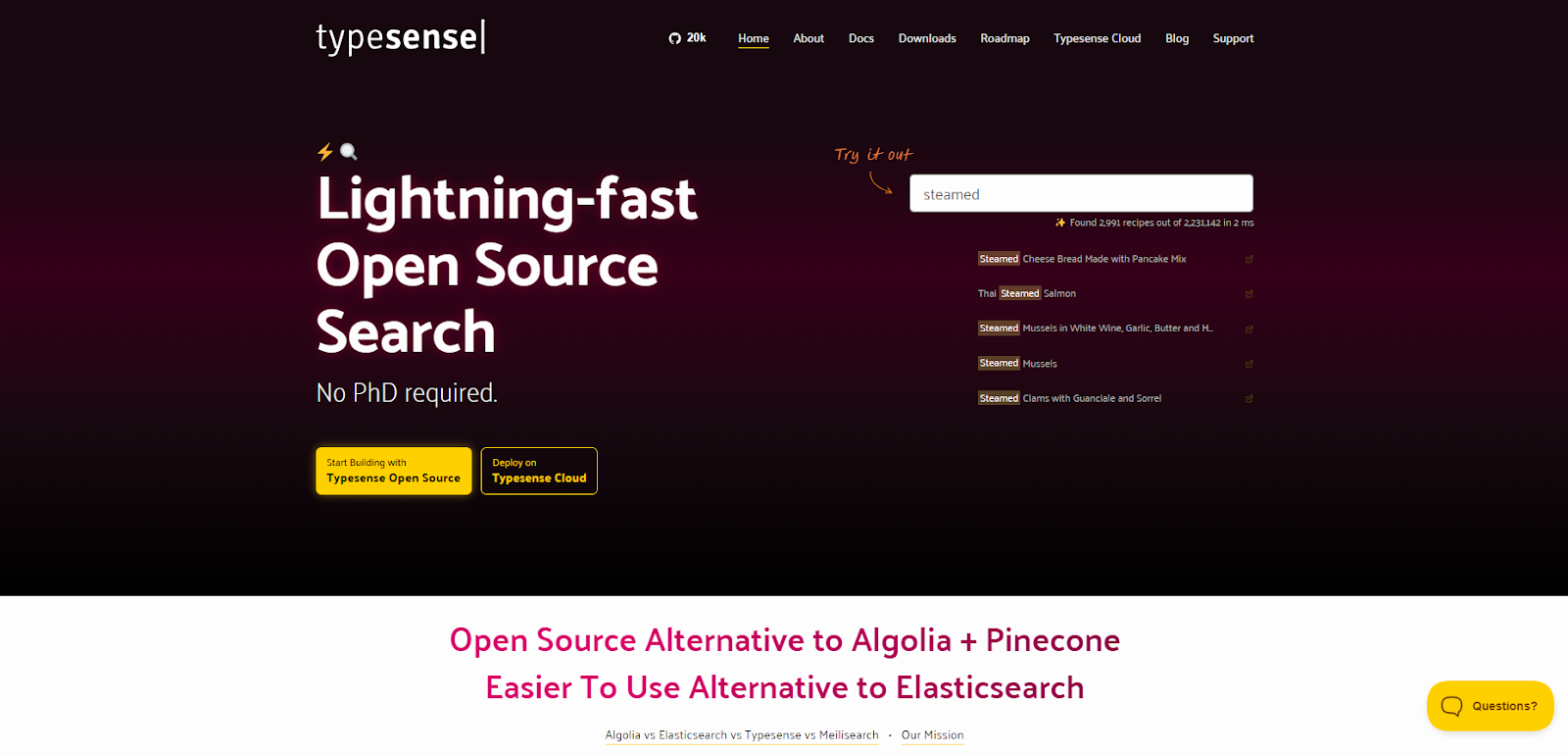
Image Source: typesense.org
Typesense also has a fully managed, hosted version called *Typesense Cloud *that is suited for users who prefer a hands-off approach to infrastructure management. It automatically handles scaling, load balancing, and failover for high availability and performance.
Pros#
- Fast and efficient, making searches quick
- Simple to set up and use, even for beginners
- Prioritizes user privacy
- Takes advantage of new technology and machine learning for better search results
Cons#
- Fewer resources and community support
- Advanced features and customizations might be limited
Pricing#
The self-hosted version has no licensing fees, but you'll need to manage the infrastructure, maintenance, and scaling yourself.
Typesense Cloud pricing is based on the size and configuration of your cluster, with additional charges for outbound data transfer.
5. Amazon CloudSearch#
Amazon CloudSearch is an AWS enterprise search software that lets you easily add a search feature to your website or app. It allows for quick setup and scaling of search solutions for websites and applications.
Its key features include support for 34 languages, faceted search, highlighting, autocomplete, and geospatial search. Amazon CloudSearch handles the provisioning of resources and maintenance to speed up the deployment process.
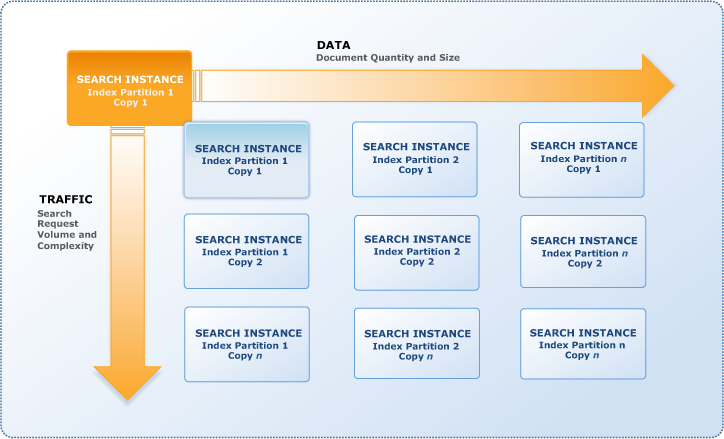
Image Source: aws.amazon.com
The service offers automatic scaling based on traffic, ensuring consistent performance. It provides a simple API for indexing and querying data, and integrates with other AWS services for security and monitoring.
Pros#
- Easy to set up and integrate into websites or mobile apps
- Scalable, growing with your project's needs
- Supports many languages and advanced search features, including visual search and federated search
Cons#
- Costs can increase as usage grows
- Limited to the AWS ecosystem, so it might only work for some
- Customization options might need to be more flexible
Pricing#
Amazon CloudSearch lets you pay only for what you use, with no setup fees. New users can start for free, and most costs come from search instance usage that allows easy scaling based on your needs.
Common Concerns With Algolia#
While Algolia is known for its fast and reliable AI search, many users eventually run into roadblocks that lead them to seek an easier-to-use alternative.
Below are some of the most common concerns that prompt developers, marketers, and tech leads to explore other open source solutions or hosted search providers.
Pricing Structure and Hidden Costs#
Algolia’s pricing is often viewed as complex. The costs can grow quickly depending on how many records and operations your app requires.
If you're running an e-commerce platform or serving multiple channels, things like the number of API calls, API keys, and usage-based limits can add up during seasonal spikes.
This creates budgeting issues by enabling businesses on-site image search, search-as-you-type, or dynamic filtering, where usage is unpredictable.
Limited Flexibility for Certain Use Cases#
Algolia offers excellent performance, but it comes with a set of constraints. It’s not always the best fit for applications that need deep customization or non-standard data structures.
For example, businesses building rich e-commerce search experiences across product catalogs, blogs, and external sources may need a solution that allows for greater control over ranking, indexing, and display logic.
This is where platforms like Denser and other open-source solutions help by allowing you to tailor search results to your unique business logic.
Proprietary Code vs. Open Source Limitations#
One major drawback of Algolia is its closed-source nature. Companies that prioritize transparency, self-hosting, or code auditing often prefer open-source solutions that provide full access to the underlying engine.
Alternatives give teams more flexibility, often with the same performance benchmarks, without vendor lock-in. It's important for teams deploying search across API clients and edge environments that require deeper integration and data control.
Rate Limits and Scalability Concerns#
While Algolia performs well under moderate usage, heavy-duty enterprise-level scaling can come with constraints.
Rate limits on indexing and search operations can impact performance during peak traffic times, especially in real-time search environments with thousands of SKUs and real-time inventory updates.
Also, advanced features like search relevance, custom relevance tuning, or multi-language support often require enterprise-tier plans, which may not be feasible for growing teams.
As a result, many companies look for an easier-to-use alternative that scales with them without breaking the budget.
Key Features to Look for in an Algolia Alternative#
When looking for an alternative to Algolia, it's important to identify the most important features for your specific business needs.
Speed and Performance#
A slow search experience can frustrate users and drive them away. A strong Algolia alternative should provide instant or near-instant search results.
It should also include mechanisms like caching to maintain performance, especially under heavy use. Tools that offer vector search can improve both speed and precision at scale.
Relevance and Customization#
It's not enough for results to be fast; they need to be relevant. The alternative should allow you to customize how search results are ranked and displayed based on your business needs.
You should look for options that enable relevance tuning based on user behavior, as well as custom ranking features that let you prioritize specific products, content, or categories.
Platforms with dynamic filters help surface more relevant results in real time.
Ease of Integration#
You'll want a search engine that integrates with your current systems. Ideally, the alternative should offer pre-built integrations for popular platforms like WordPress or Shopify.
APIs allow different software to communicate with each other. A search platform with clear and well-documented APIs makes integration smoother.
Pricing#
Pricing is often a major factor for e-commerce businesses. While Algolia has strong features, its cost can be prohibitive for smaller businesses.
Many alternatives like Denser offer more flexible pricing models, including a free plan and three premium plans for different types of needs.
Some even offer freemium models for businesses that don't need advanced features right away.
A transparent pricing structure without hidden fees is essential to make sure you're not caught off guard by unexpected costs.
Scalability and Flexibility#
As your business grows, your search solution needs to grow with it. A high-quality Algolia alternative should be able to handle increased traffic and larger datasets.
It needs to offer the flexibility to scale without sacrificing performance or requiring complex upgrades. Look for solutions with advanced capabilities that continue to support innovation.
Should You Switch to Smarter Search?#
If you're looking to make your website or app more engaging, smarter chatbots could be the answer.
Traditional search engines, like Algolia, help users find information but don't offer much interaction or personalization.
Smarter chatbots, on the other hand, provide real-time responses that feel more natural and human-like.
Denser goes beyond typical search solutions, using advanced AI and NLP to power chatbots and understand the intent behind queries for more accurate, context-aware responses.
What makes AI chatbots better is their potential for real-time engagement. Unlike a static search bar, smarter chatbots can provide instant feedback and personalized product suggestions.
They can even offer upsell or cross-sell opportunities in a conversational way to increase conversions and customer loyalty.
Customers are more likely to trust the platform and stay engaged longer with a more human-like interaction.
So, if you're ready to transform your customer interactions from a basic search experience into a fully immersive journey, it might be time to switch to smarter chatbots.
How to Integrate Denser Into Your Website#
Switching to Denser from Algolia to improve your website's chatbot involves a few easy steps.
This guide will show you how to easily add the Denser chatbot to your site and connect its features using REST requests.
Embedding the Chatbot Widget#

- Locate the Embed code: Denser will provide a snippet of code to embed the chatbot widget into your website. This usually involves a simple script tag that you'll insert into the HTML of your webpage.
- Customize with your Chatbot ID: The provided code snippet contains a placeholder for chatbotId. Replace this with the actual chatbot ID provided by Denser. This ID uniquely identifies your chatbot and links it to your Denser account.
- Insert the code: Choose your website's specific page or section where you want the chatbot widget to appear.
Then, insert the modified code snippet into the HTML of your webpage at the desired location.
Consider adding it to a global footer or sidebar template that appears across your website for broader availability.
Making REST Requests to Your Chatbot#

- Prepare the REST request: Denser allows you to interact with your chatbot through RESTful requests. You can programmatically send queries to your chatbot and receive responses outside the widget.
- Use the curl command: Denser will provide a curl command for testing and integration. To tailor the request to your specific chatbot, replace chatbotId in the curl command with your actual chatbot ID.
- Integrate with your backend: You can use this curl command to integrate chatbot interactions into your backend systems. This could be useful for more complex interactions or processing data before or after interacting with the chatbot.
Create a Smarter Search Experience With Denser!#
Are you frustrated with your current search platform's rising costs or limitations? What if there were an affordable and simpler option? Denser is a fast and reliable site search solution that adapts to your business needs.
With instant, reliable responses, Denser delivers better results without the steep learning curve.
Unlike a typical typo-tolerant search engine, it understands what users are trying to find, even with vague or misspelled input. Denser helps brands create truly delightful search experiences that feel intuitive, fast, and satisfying.
Powered by advanced AI and natural language processing, Denser's chatbots go beyond basic responses to understand user intent and deliver context-aware answers.
Why settle for static search when you can offer dynamic, personalized support? Upgrade to Denser and see how smarter chatbots can transform your user experience.
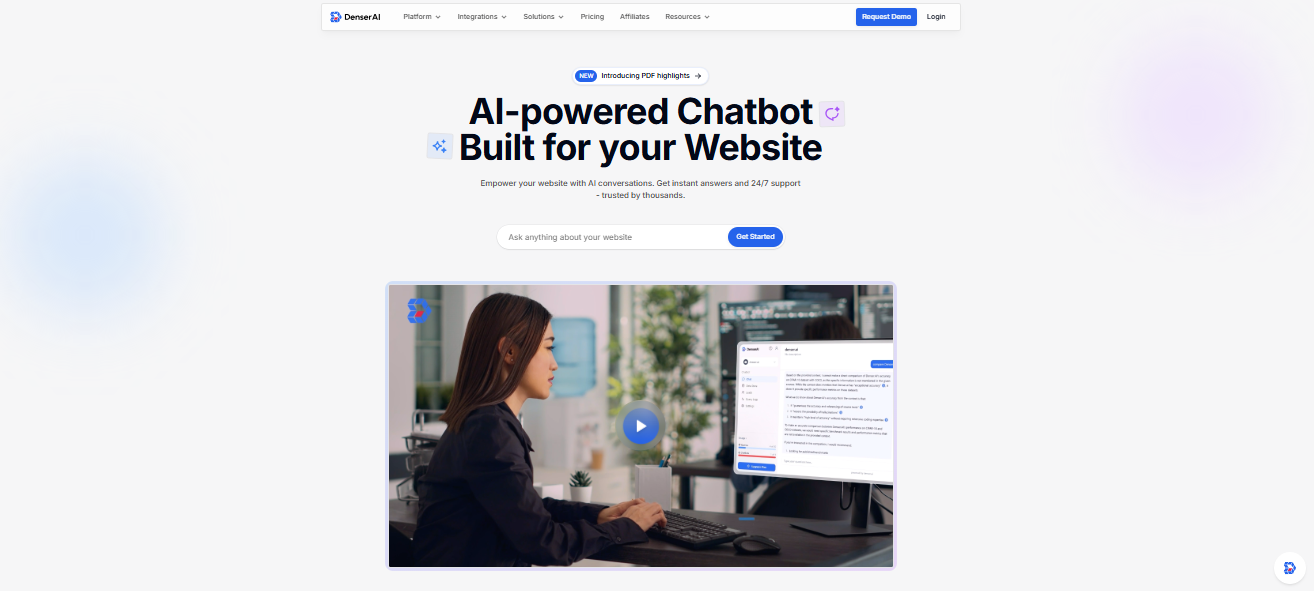
Sign up for a free trial or schedule a demo today!
FAQs About Algolia Alternatives#
What is similar to Algolia Search?#
Tools like Elasticsearch, Meilisearch, Typesense, and Denser offer similar features. They help users build fast, relevant search experiences for websites and apps.
What is the average cost of Algolia?#
Algolia offers a free plan for small projects, while paid plans start at about $0.50 per 1,000 searches. Larger businesses can expect custom pricing, with some enterprise plans costing over $350,000 per year, depending on usage and features.
What is the difference between Bloomreach and Algolia?#
Algolia focuses on speed, relevance, and developer tools. Bloomreach adds AI personalization and product discovery tools, making it more tailored to large eCommerce sites.
In short, Algolia is more search-focused, while Bloomreach offers a broader marketing and merchandising platform.